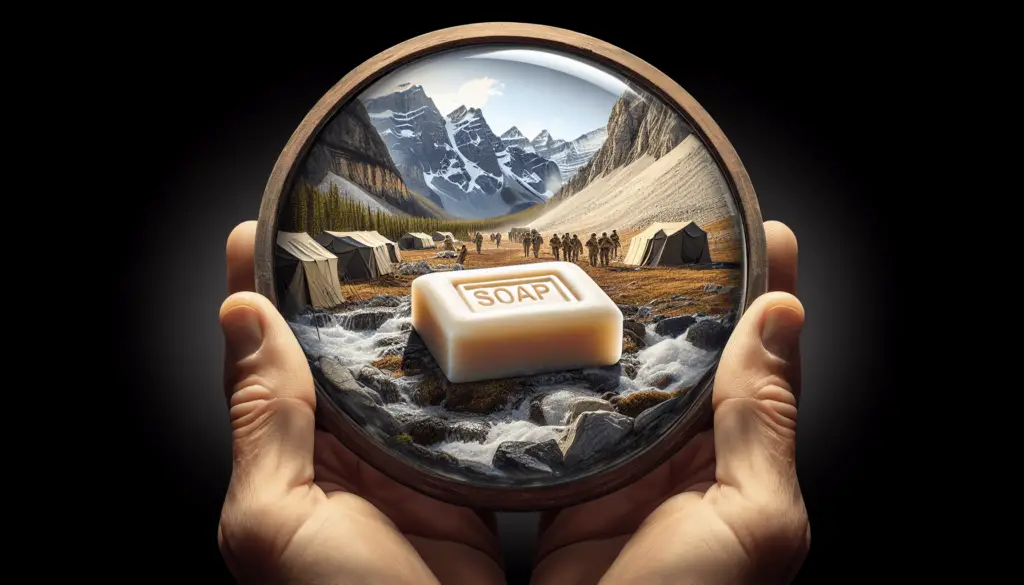Welcome to an article that highlights the significance of maintaining good hygiene in survival situations. When facing the challenges of the great outdoors or unexpected emergencies, proper hygiene practices can make a significant difference in your overall well-being and survival. From preventing the spread of disease to boosting morale and mental health, taking care of your hygiene needs is crucial in any survival scenario. So, let’s explore the importance of good hygiene and learn some essential tips to keep yourself clean and healthy in challenging situations.
The Importance of Good Hygiene in Survival Situations
Have you ever wondered how crucial good hygiene is in survival situations? From preventing illness to maintaining mental well-being, proper hygiene can make all the difference when you’re faced with challenging circumstances. Let’s delve into the importance of good hygiene in survival situations and how you can ensure you stay healthy and strong when the going gets tough.

Why is Good Hygiene Vital in Survival Situations?
When you find yourself in a survival scenario, maintaining good hygiene practices might not be the first thing on your mind. However, neglected hygiene can lead to a myriad of problems that can hinder your ability to survive. Proper hygiene is essential for preventing infections, promoting overall health, and preserving morale. By prioritizing hygiene, you can increase your chances of making it through tough times with your physical and mental faculties intact.
The Risks of Poor Hygiene in Survival Situations
Neglecting hygiene in survival situations can expose you to various risks that can compromise your health and well-being. Without proper cleanliness practices, you may be more susceptible to infections, illnesses, and injuries. Poor hygiene can also affect your mental state, leading to decreased morale and motivation. By understanding the risks associated with poor hygiene, you can better appreciate the importance of maintaining good hygiene practices in survival scenarios.
Maintaining Personal Hygiene in Challenging Environments
Ensuring personal hygiene in challenging environments requires a proactive approach and an understanding of effective hygiene practices. From keeping your body clean to managing waste responsibly, there are several essential hygiene habits to incorporate into your survival routine. By prioritizing personal hygiene, you can protect yourself from illness, maintain your physical health, and boost your overall well-being in challenging situations.
Personal Hygiene Habits in Survival Situations
In survival situations, personal hygiene habits become even more critical for your health and safety. Simple practices such as washing your hands regularly, keeping your body clean, and maintaining oral hygiene can significantly reduce your risk of infections and illnesses. Additionally, managing waste properly and practicing safe food handling can help prevent contamination and the spread of harmful bacteria. By adhering to these personal hygiene habits, you can protect yourself from health risks and stay resilient in challenging environments.
The Impact of Hygiene on Mental Well-Being in Survival Situations
While good hygiene is essential for physical health in survival scenarios, its impact on mental well-being should not be overlooked. Maintaining cleanliness and personal hygiene can have a positive effect on your morale, motivation, and psychological resilience. In challenging environments, practicing good hygiene can provide a sense of normalcy, control, and comfort, helping you cope with stress and uncertainty. By prioritizing hygiene for both physical and mental well-being, you can better navigate survival situations and stay mentally strong in the face of adversity.
Boosting Morale Through Personal Hygiene
In survival situations, personal hygiene can play a significant role in boosting morale and maintaining a positive outlook. Taking the time to clean yourself, groom, and engage in basic hygiene rituals can uplift your spirits and provide a sense of normalcy amidst challenging circumstances. Feeling clean, refreshed, and presentable can boost your confidence, self-esteem, and overall morale, helping you stay mentally resilient and focused on survival goals. By recognizing the impact of personal hygiene on mental well-being, you can harness its power to stay positive and resilient in demanding situations.

Hygiene Practices for Clean Water and Food Safety
In survival situations, ensuring the cleanliness and safety of water and food sources is paramount for maintaining good hygiene and preventing illness. Contaminated water and food can harbor harmful bacteria, parasites, and pathogens that can cause a range of health problems. By implementing proper hygiene practices for water collection, purification, and food preparation, you can minimize the risk of waterborne and foodborne diseases and safeguard your health in challenging environments.
Water Collection and Purification Hygiene
When sourcing water in survival situations, it’s essential to prioritize hygiene to prevent contamination and ensure water safety. Proper hygiene practices for water collection involve using clean containers, avoiding cross-contamination, and storing water in secure vessels. Additionally, implementing effective water purification methods such as boiling, filtering, or using water purification tablets can further reduce the risk of waterborne illnesses. By maintaining hygiene standards for water collection and purification, you can access clean and safe drinking water vital for your health and survival.
Food Preparation and Storage Hygiene
In survival scenarios, safe food preparation and storage are crucial for preventing foodborne illnesses and maintaining good hygiene. Practicing proper hygiene when handling and preparing food involves washing hands, utensils, and surfaces regularly to prevent cross-contamination. Additionally, ensuring food storage containers are clean, airtight, and placed away from pests can help preserve food quality and safety. By following hygiene guidelines for food preparation and storage, you can reduce the risk of foodborne diseases and maintain a healthy diet essential for survival.
Maintaining Hygiene in Shelter and Sleeping Areas
In survival situations, maintaining cleanliness in shelter and sleeping areas is essential for preventing infections, promoting restful sleep, and preserving personal comfort. Hygiene practices for shelter and sleeping areas involve keeping living quarters clean, dry, and well-ventilated to reduce the risk of mold, pests, and bacteria. Additionally, practicing proper bedding hygiene, such as changing and airing out bedding regularly, can enhance comfort and sleep quality. By prioritizing hygiene in shelter and sleeping areas, you can create a safe and comfortable environment conducive to rest, recovery, and overall well-being in survival scenarios.
Shelter Maintenance and Cleanliness
Effective shelter maintenance and cleanliness are vital for ensuring a safe and healthy living environment in survival situations. Keep shelter clean by sweeping floors, wiping surfaces, and removing debris to prevent the buildup of dirt, dust, and pests. Ventilating shelter regularly by opening windows or creating ventilation openings can improve air quality, reduce moisture levels, and prevent mold growth. By practicing good shelter maintenance and cleanliness, you can create a hygienic living space that protects your health and enhances your comfort in challenging environments.
Bedding Hygiene and Comfort
Bedding hygiene plays a crucial role in promoting restful sleep, preventing skin irritations, and maintaining personal comfort in survival situations. To maintain bedding hygiene, change and wash bedding regularly, air out pillows and blankets, and keep sleeping areas clean and free of pests. Consider wrapping bedding in waterproof materials to protect against moisture and pests and enhance bedding longevity. By prioritizing bedding hygiene and comfort, you can create a restful and rejuvenating sleep environment essential for your physical and mental well-being in survival scenarios.
Best Practices for Personal Hygiene Products and Supplies
In survival situations, having access to essential personal hygiene products and supplies can make a significant difference in maintaining cleanliness and preventing health risks. Pack a personal hygiene kit containing items such as soap, toothpaste, hand sanitizer, wet wipes, and menstrual hygiene products to meet your hygiene needs. Consider including a portable water filter or purification tablets for clean water consumption and hygiene practices. By preparing a well-equipped personal hygiene kit, you can ensure you have the necessary supplies to prioritize hygiene and stay healthy in challenging circumstances.
Essential Personal Hygiene Products
Stocking up on essential personal hygiene products is vital for maintaining cleanliness and preventing infections in survival situations. Include items such as soap, toothpaste, shampoo, deodorant, and sunscreen in your hygiene kit to support your daily hygiene routine. Additionally, pack personal care items like toothbrushes, razors, combs, and nail clippers to maintain grooming practices and personal hygiene standards. By ensuring you have essential personal hygiene products on hand, you can uphold hygiene practices and preserve your health and well-being in survival scenarios.
Hygiene Supplies for Cleanliness and Protection
In survival scenarios, having hygiene supplies for cleanliness and protection is essential for safeguarding your health and well-being. Pack items such as hand sanitizers, wet wipes, disinfectant wipes, and gloves to clean hands, surfaces, and equipment effectively. Include antibacterial ointments, bandages, and wound care essentials to treat injuries and prevent infections. Consider carrying insect repellents, sunscreen, and lip balm for protection against bugs, UV rays, and environmental hazards. By stocking up on hygiene supplies for cleanliness and protection, you can prioritize hygiene and stay safe in challenging environments.
Conclusion
In summary, good hygiene is crucial for survival in challenging situations, as it helps prevent illness, maintain health, and preserve mental well-being. By understanding the risks of poor hygiene and implementing effective hygiene practices, you can protect yourself from infections, promote overall well-being, and stay resilient in survival scenarios. Prioritize personal hygiene, water and food safety, shelter cleanliness, and hygiene product preparedness to ensure you stay healthy and strong when faced with demanding circumstances. Remember, good hygiene is not just a luxury but a necessity for survival – so make it a priority in your survival toolkit.
